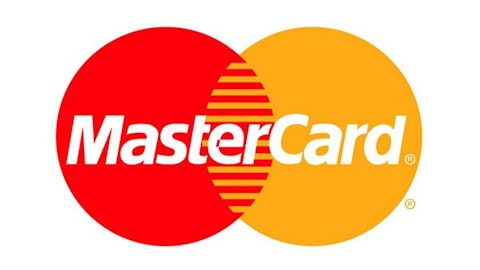“And, by the way, the bulk of the billions in Berkshire Hathaway has come from the better businesses. … And most of the other people who’ve made a lot of money have done so in high-quality businesses.” — Charlie Munger
At Tier 1 Investments, a Motley Fool Real-Money Portfolio, I seek out and invest in elite businesses. These include companies with the strongest competitive advantages, greatest growth opportunities, and best management. I call these businesses Tier 1 enterprises, and Mastercard Inc (NYSE:MA) fits that description perfectly.
A wide moat

As a financial services company, having a respected and trusted brand is of paramount importance. Mastercard Inc (NYSE:MA) has been able to build such a brand thanks in part to the fantastic success of its nearly two-decade-old “Priceless” advertising campaign, and has strengthened its brand image by earning a reputation for the reliability and security of its payment processing platform.
Mastercard Inc (NYSE:MA) also enjoys powerful network effects, as each new merchant that accepts MasterCard makes the network more valuable to consumers, and each new consumer who carries MasterCard increases the potential pool of customers for participating merchants (thanks to an easier means of purchase and therefore likelihood of sale).
Mastercard Inc (NYSE:MA) earns a small fee from every transaction that passes through its payment network, and its tollbooth business model produces steady, fast-growing cash flow. It also helps MasterCard earn extremely impressive operating margins (53.5% in 2012) and returns on capital (38.5%). Those are some of the highest I’ve seen among all the companies I follow, and they are strong signs of competitive advantage.
The numbers tell the story
Mastercard Inc (NYSE:MA)’s powerful brand and network have helped the company build massive scale. Three numbers in particular stand out:
1). 2 billion: How many cards displayed MasterCard’s logo over the past year.
2). 34 billion: The number of transactions the company processed in 2012.
3). 3.6 trillion. The dollar amount of the transactions that flowed through MasterCard’s network.
From these numbers you can get a sense of the tremendous scale that this business already enjoys. But the most important number, and what’s most exciting to me, is the number 85. That’s the percentage of global transactions that are still made via cash or check. Thus, MasterCard is an already dominant business, but it still has tremendous room for growth as the world continues to move away from cash and toward electronic payments. And few companies are as well positioned to benefit from this trend as MasterCard.
Excellent management
Leading MasterCard toward this exceptional profit opportunity is CEO Ajay Banga. He joined MasterCard in 2009 and brings valuable international experience from prior leadership positions at firms such as Citigroup Inc. (NYSE:C). Much of MasterCard’s growth lies overseas, and Banga’s global skillset wills serve the company well. MasterCard’s employees seem to agree; 87% approve of the CEO, according to Glassdoor.com.
Risks
MasterCard, despite its strengths, is not invulnerable to competition. eBay Inc (NASDAQ:EBAY)‘s PayPal poses the greatest threat, as its electronic payments network has been experiencing strong growth, particularly in the mobile space. Even titans such as Google Inc (NASDAQ:GOOG), Amazon.com, Inc. (NASDAQ:AMZN), and Apple Inc. (NASDAQ:AAPL) have either entered or are rumored to be entering the payments space. While these threats are not to be taken lightly, it also should not be forgotten that MasterCard serves as a partner for many of these services, helping to process transactions or serve as a funding source. So while these rivals may challenge MasterCard’s growth in some respects, their success could also benefit MasterCard.
MasterCard is also not immune to global economic slowdowns. A pullback in consumer spending would hurt the company’s transaction revenue. But markets operate in cycles, and a downturn of this nature would ordinarily be followed by an economic recovery. So I will likely view these types of pullbacks as opportunities to add to Tier 1’s position in MasterCard, rather than a reason to sell.



